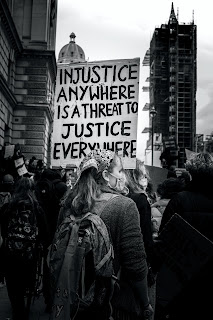Day 73 – Orientation readings
Day 73 – So, in preparing to return to campus and teaching, I thought
I would start with reading the new Orientation reading. Several of the readings for this year’s Orientation
are new to me!! I love that!! 
Photo by Sandra Seitamaa on Unsplash
We as a faculty are working very hard to be more transparent about our pedagogical frameworks, and to bring our work into sharper relief! For many years we used the text, Introduction to Counseling: Voices from the Field (8th ed.), by Kottler and Shepard (2015). While I thought it was a good text, I’m glad we’ve let it go – and are now reading these few articles that are more focused on specifically on “awareness of intersectionality, social justice, and anti-racism practices” – from our Pedagogical Frameworks.
My first peek was at the APA resolution on harnessing psychology to combat racism: Adopting a uniform definition and understanding published in Feb 2021. What an important step it was for the APA to finally publish a public apology – and then a resolution to combat racism. This really spoke to the role psychology has played in upholding fundamental racism in our society: The first statement in the resolution sets out the overview of racism:
Whereas racism has been an enduring, insidious, and pervasive feature of the United States (U.S.) landscape that often operates outside of the conscious awareness of its targets, perpetrators, and beneficiaries, and has had an incalculable, negative toll on the basic human rights to survival, security, health, well-being, and societal participation of generations of people in the U.S. and across the globe (Alvarez et al., 2016; APA, 2012; 2019)
It takes a lot for us within the US to acknowledge the enduring, insidious, and pervasive nature of racism, because every day we are told that the US is an exceptional country that had a rough past but that we have overcome it and we are the best! To not acknowledge racism, also keeps us from not acknowledging racial trauma – which many people in our country experience daily! Mosley and her colleagues (2021) describe racial trauma experienced particularly by anti-black racism this way:
Racial trauma, also referred to as race-based traumatic stress, is the psychological, emotional, and physical injury from experiencing real and perceived racism (Bryant-Davis, 2007; Carter, 2007). Racial trauma accounts for experiences of racism inclusive of overt (e.g., use of racial slurs) and covert (e.g., exclusion based on assumptions of racial inferiority) interpersonal discrimination and harassment, as well as institutional and systemic racism (e.g., systemic excessive use of force by the police; Bryant-Davis & Ocampo, 2006; Carter, 2007).
Gaining the kind of cultural humility necessary for many people to acknowledge this level of deconstruction of the dominant narrative is an important step in beginning to embark on a practice rooted in an anti-oppressive framework. I found this quote from the Hook and colleagues (2017) introduction helpful:
We encourage you to take a close, hard look at yourself. If you are like most people, you probably have certain areas of strength for working with clients and their cultural identities, but you probably also have certain areas for growth, including struggles and biases. We encourage you to step into these areas of growth with courage, rather than retreating into your areas of comfort and avoiding the discussion. Finally, we discuss practical strategies for engaging with clients and their cultural identities, including repairing mistakes that threaten the therapeutic relationship.
I’m excited by these readings – and feel challenged to personally understand and acknowledge the enduring, insidious, and pervasive nature of racism I take for granted as “normal” in my everyday life. I want to look for ways to question this and to work at dismantling the ways the dominant narrative lives in my own life.
American Psychological Association (APA). (2021, February). APA resolution on harnessing
psychology to combat racism: Adopting a uniform definition and understanding. https://www.apa.org/about/policy/resolution-combat-racism.pdf
DiAngelo, R., & Sensoy, Ö. (2014). Leaning in: A student’s guide to engaging constructively with social justice content. Radical Pedagogy, 11(1), 1-15. https://robindiangelo.com/wp-content/articles/rad-ped-leaning-in.pdf
Hook, J. N., Davis, D., Owen, J., & DeBlaere, C. (2017). Introduction: Beginning the journey of cultural humility. In Cultural humility: Engaging diverse identities in therapy (pp. 3-16). American Psychological Association.
Mosley, D. V., Hargons, C. N., Meiller, C., Angyal, B., Wheeler, P., Davis, C., & Stevens-Watkins, D. (2021). Critical consciousness of anti-black racism: A practical model to prevent and resist racial trauma. Journal of Counseling Psychology, 68(1), 1–16. https://doi.org/10.1037/cou0000430



Comments